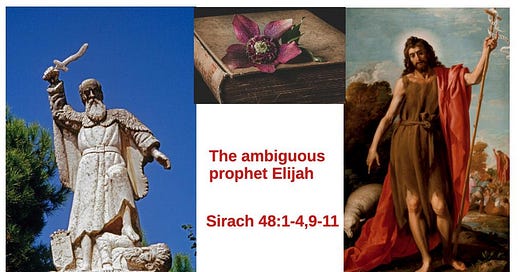Our reflection today focuses on a fragment from the Book of Sirach written in praise of the prophet Elijah. This book is not included neither in the Hebrew text of the Bible nor in the Protestant Bibles. The Book is present in the Septuagint - the ancient Greek translation of the Hebrew Bible - and has been included in the Catholic Cannon. The book was written around 180 BC in Hebrew and was translated into Greek around 132 BC. It belongs to wisdom literature and its author aims to teach his readers how to remain faithful to their ancient religious tradition in the face of new philosophical and religious currents coming from Greece.
Elijah is considered one of the greatest prophets in Old Testament second only to Moses. The author praises him for his mighty acts that included causing famine in the land of Israel, bringing three times fire from heaven, raising the dead to life, influencing the change of power in Israel and neighbouring nations, having the revelation of the Lord on Mount Horeb and being taken up to heaven in a whirlwind of fire (see Sirach 48:1-9, 1 Kings 17 - 2 Kings 2:12). Sirach is also a witness to a Jewish tradition that expected Elijah to return before the day of the Lord (Sirach 48:11; see Malachi 3:23-24).
But, reading those praises from our perspective of religious violence, famines in different parts of the world due to human destruction of the environment, and wars with planes and drowns throwing bombs at innocent populations makes many feel uncomfortable. Some scholars called Elijah and his close disciple Elisha, the leaders of the "YHVH-only" movement that opposed an attempt to introduce the worship of Baal, a Tyrian deity by Israeli king Ahab and his Tyrian wife Jezebel. The opposition was a violent one. For example, Elijah killed 450 prophets of Baal and also inspired a military coup against the ruling dynasty of Omrides. Later on, we are told that he brought twice fire upon soldiers of King Ahaziah who tried to capture him.
In Christian tradition, John the Baptist is seen as fulfilling the role of Elijah to prepare the nation of Israel for the coming of the Lord. But, John's life and personality were different from that of Elijah. We do not hear about John causing famine upon the earth or bringing fire upon anybody. Moreover, he was not taken up to heaven "in a whirlwind of fire" but beheaded in prison and buried by his disciples. The zeal of Elijah is indirectly criticised by Jesus in the famous exchange of words with his two zealous disciples, John and James. Like Elijah, they wanted to bring fire upon the inhospitable Samaritans. Jesus rebuked them for entertaining such thoughts and in some ancient manuscripts, his exact words were:
"‘You do not know what sort of spirit you are of, for the Son of Man did not come to destroy people’s lives, but to save [them].’” (Luke 9:55).
Every person in our world and particularly every disciple of Jesus should always have these words before their eyes. In a world where violence is on the rise and human life is often disregarded, we should never forget that we are followers of Jesus Christ in whom there was no violence and who saved the world not by destroying sinners but by sacrificing his life for them.




